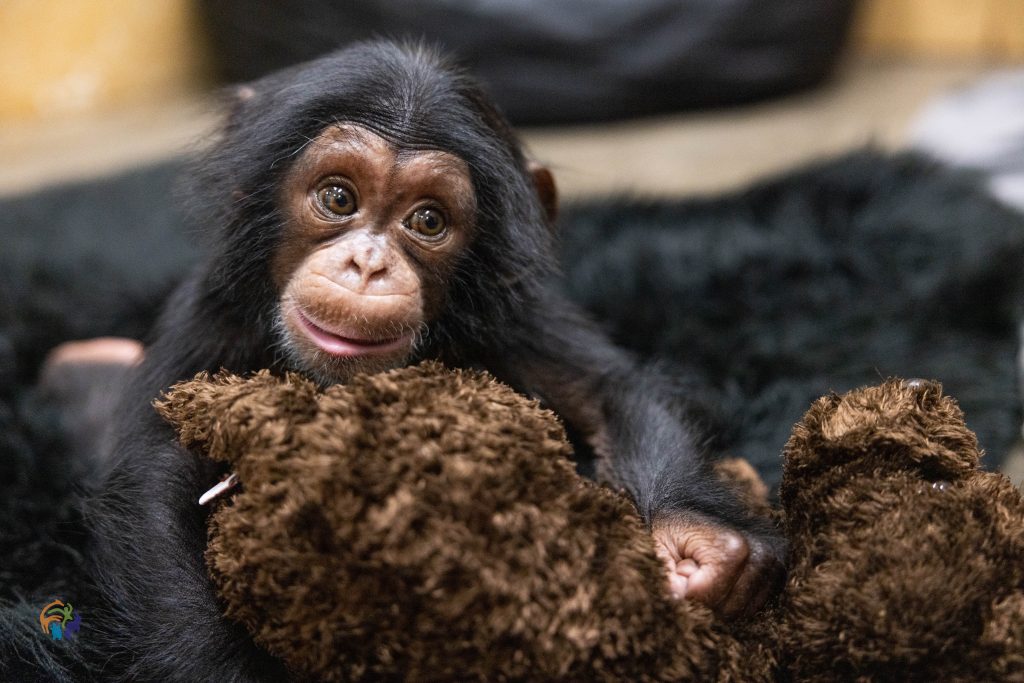
Caring for Stevie: A Round-The-Clock Commitment Part 2
Written by: Scarlett Rockhold, Communications Manager at Zoo Knoxville
This year Earth Day brought new life when 37-year-old chimpanzee, Binti, gave birth to a baby girl named Stevie. Chimpanzees are social beings and as a troop, worked together to help the new mother care for this newest addition. Immediately after the birth, Daisy, an experienced chimp mother took the baby, cleaned her, cleared her airways and cared for her when Binti appeared to be in distress.
Once Binti delivered Stevie, she was lethargic and passed out. She was retaining the placenta and needed help. The University of Tennessee College of Veterinary Medicine team intervened and anesthetized her in order to help with the afterbirth.
Nursing immediately after birth is important because of the benefits colostrum can offer the newborn. Colostrum is the first form of breastmilk that is released after giving birth. It is nutrient-dense and high in antibodies and antioxidants to build a newborn baby’s immune system.
The Great Apes team was able to hold the infant up to Binti while she was under anesthesia to allow her to nurse. These efforts by Zoo staff and the UTCVM team were successful in getting the colostrum to the baby, but due to Binti’s physical state at the time, nursing was no longer an option. The decision to hand-raise the infant was the only decision at that point.
This decision carries with it a lot of responsibility for Zoo staff to not only ensure the physical health of the baby, but also her mental and social health. This undertaking requires 24-7 care from Zoo Knoxville’s expert primate care team.
In order to more easily integrate back into the troop, it is crucial for a hand reared infant chimp to develop normal social behaviors early on. For the first few weeks of life, keepers must mimic a mother chimp by wearing a fur vest to allow the chimp to hang on. Other responsibilities include keeping detailed records of behaviors, development of motor skills, food consumption, sleep patterns and milestones. The infant must be bottle-fed on demand (usually every 2-3 hours) for the first 3 months and must also be given daily time outside as well as access to the sights, sounds, and smells of the troop.
The goal is to re-socialize Stevie with the troop as soon as it is safely possible. The earlier she can integrate the better her odds at being a normal chimp and future mother. To support this goal, Stevie is being visually introduced to the troop daily through the window of her nursery or sometimes mesh, so they can interact. These introductions give the female chimps the opportunity to show interest in maternal or aunting behavior, so that Stevie’s care will continue once the re-socialization is complete. This surrogate opportunity is even available to the male chimps.
We are happy to report that Stevie is currently hitting all of her milestones. At 10 weeks old she is now able to vocalize with her troop during her daily visits. She is also a great eater weighing in at 6lbs and starting to crawl. Keepers are currently training Stevie to take a bottle through the mesh, and working on getting her strong enough to pull up on the mesh. Even after integration with her troop, she will need to take a bottle this way, so hitting this milestone is crucial.
All of this important species saving work is being done in a nursery behind the scenes for now. This allows Stevie to be a chimp and gives her the best possible chance at re-socialization with her troop. Chimpanzees are an endangered species, and being driven to extinction by habitat loss, disease, and their biggest threat, illegal poaching. Zoo Knoxville is working in partnership with 32 other zoos accredited by the Association of Zoos and Aquariums (AZA) to ensure a healthy population remains as hope for the future.
As a Zoo accredited but the Association of Zoos and Aquariums, Zoo Knoxville is part of the largest conservation movement on the planet. Join us in our mission by becoming a member, adopting an animal, or donating today.
Support the Zoo